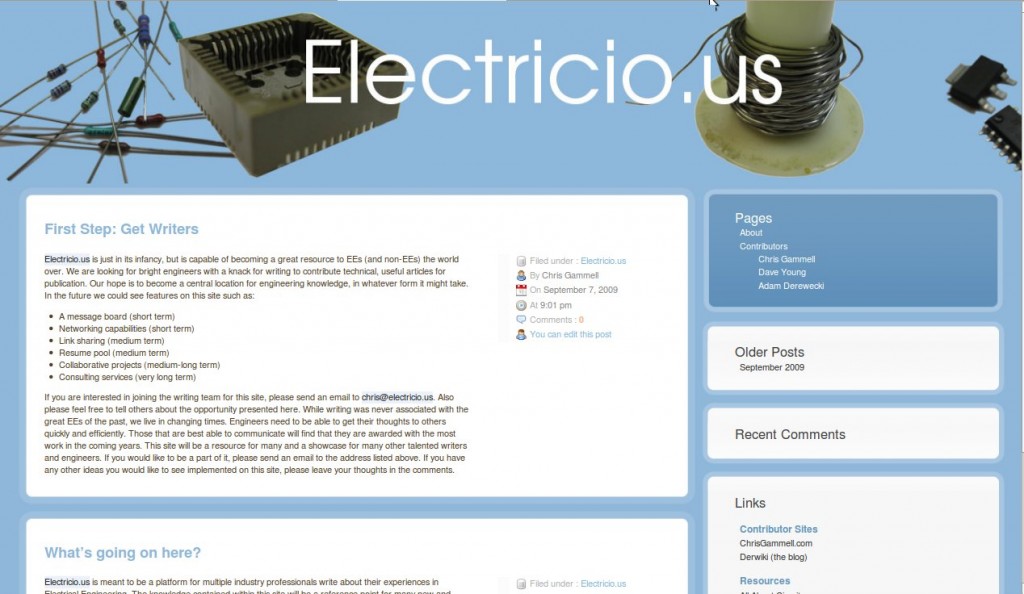Much like I’m not going to say that I’ve been too busy to post anything for the past 2-3 months, I’m not going to say that I’m definitely going back to school to get an advanced degree. However, I’ve considered saying both.
Really, I’ve considered going back to school as soon as I started my first job and was dissatisfied. I mean, who hasn’t? Aside from the fact that I was previously on a co-op cycle of (work, school, work, school, and so on), I really felt nostalgic for school; I found myself saying things like: “It’s so much less work when you’re in class for a few hours a day!”, “I’ll definitely love all those new subjects I’ll be studying!”, “I’ll have lots of free time during the day to get things done and then study at night!” and many others. They’re all complete bull of course, none of those things are true for full time grad students. In fact, school can be much harder at times. I often found myself so overloaded between (continued) work and school that I would be sleeping four hours a night; plus I’m guessing I would have been sleeping those same four hours had I not been working, the waking hours would have just been spent more effectively on my classes.
The only problem now is I can’t be a full-time student.
Well, I could, but all the kinds of debt I’d get myself into would be really unrealistic for the amount I would gain from an advanced degree. Since buying and fixing up my home last winter, I have taken on some markedly adult-like responsibilities in my life. And so I began investigating options. Going back to school is not something that I take lightly, nor should anyone out there; in the event that I make it back to school in the near future, it will be a long slog through homeworks and tests and unrealistic deadlines and the such. And all for a piece of paper. Luckily I had some great advice about school/work/life balance from my former boss and mentor:
Based on my experience, I would say make sure that all of your house projects are complete before you start and don’t plan on starting any new projects until you get your degrees (both of ‘em!). Also make sure your personal life is well-organized and in good working order. Don’t take in any more dogs, cats, or other mammals. You may also need to (*gasp*) scale back your musical activities.
While he was obviously joking about certain things there (no more music??), I take his advice to heart; I’ve also seen similar behavior from co-workers who are also in school right now. You really have to throw yourself into studies to get the most out of it. I think my perspective now that I’ve been out in the working world for a while will really allow me to succeed, both in the things I have already learned and how I approach problems.
The first kind of decision I will need to make is what kind of Master’s degree I would want to attain. I was actually quite surprised there was even more than one option available. The first degree I think most people think of in Electrical Engineering is an Masters of Science in Electrical Engineering (MSEE of MScEE). I already missed the boat on the BS/MS program that my alma mater offered; this was a program that allowed students to automatically segue from their undergraduate studies into an advanced degree, often taking Master’s courses early to help push the amount of time spent on the MS down to 1 year. So the next option I could have done was go back to school for a Master’s degree (the normal way) and then write a thesis at the completion of my studies. This would likely involve research with a faculty member and the thesis would be based around that research. I doubt this option would be possible for me, because of the aforementioned house, mortgage and “grown-up” responsibilities, up to and including my job (which I wouldn’t want to give up either). Yet another option would be a “project-only” MSEE offered at some schools that would involve the same coursework as any other master’s degree; however, the thesis would be replaced with a project, possibly in conjunction with day-job projects (but probably segmented in some way or another). At the programs I am looking at, this option is only allowed when working full time and going to school part time; luckily, that is one of my few options. The other interesting option is something that is called a “Master’s of Engineering” (in Electrical Engineering in this case). My alma mater offers such a degree (abbreviated as “MEng”) and has a streamlined course offering for engineers in my situation. The degree leans more towards mixing business and science, as many engineers do on a daily basis. In that regard, it could be a very helpful degree, in the event it imparts the necessary business acumen to get by in the hard business world. However, I question the degree and how it would be viewed in the working world once I am finished:
- Will employers view it as a lesser degree if I try to stay in the technical field?
- Will a MEng degree limit where I can go in my career?
- Do I ever want to get a PhD or am I OK with a “terminal degree” such as an MEng?
- Will I be able to learn all the technical things in a more balanced program such as the MEng?
I’ve also been considering which schools I would even be able to attend. Thanks to the digital age, commuting distances have been shortened to only the time it takes for light to travel down a wire. What that means for John Q Public-school-graduate such as myself is that a lot more schools are now accessible to a full time worker. And not just the University of Phoenix here either. We’re talking top 50 engineering schools. Who you ask? How about:
- Stanford
- Georgia Tech
- Purdue
- University of Florida
Even those four provide a pretty heavy hitting list of top research institutions offering the course work entirely online. Sure, this might be a more difficult way to collaborate with others in your class or work on projects or communicate with the teacher; but it also means that geographical barriers are becoming less and less of an issue. If I had an online electronics store that I ran out of a shack in the backwoods of North Carolina, I could now attend the number 2 engineering school in the country just as well as someone living in Palo Alto (assuming I was accepted). So while I do have a wonderful institution and my alma mater in my backyard (CWRU), I also have more options and more specialized coursework for whatever branch of EE I would like to explore more.
So what next? I guess now I have to take the GRE and get applying (and eventually figure out how I would pay for it all…). As much as I’ve thought about the potential convenience of going to an online version of a school, it’s applying just like any other Master’s Student. So really the online programs are more like you’re enrolled at the school, you just can’t ever make it to class because you’re sick all the time; plus the professors are nice enough to send home your schoolwork (but not in a folder like back in elementary school days).
In the coming weeks/months/years (who knows?), I’ll try not to write about school plans too much. However, think there are some issues that merit discusion on here and elsewhere (and hey, I like getting help from people responding in the comments). I’ll probably write at least once about my potential area of studies (should they be similar to what I’m doing right now? Should they be more towards my interest in DSP?). I’d really love feedback from anyone that happens to read this, especially students who went back to school after being in the working world for a while. Please leave any tips or tricks you might have in the comments.


